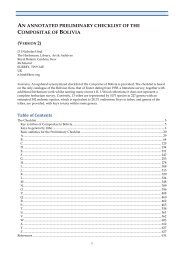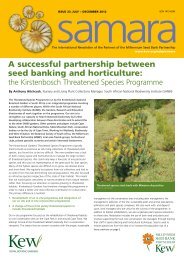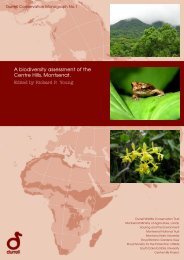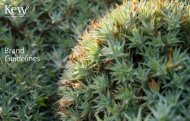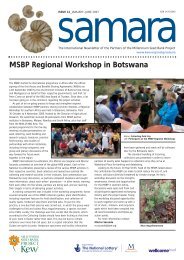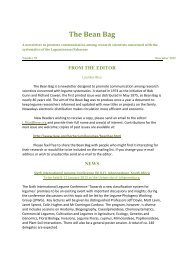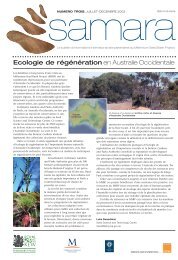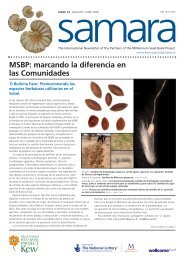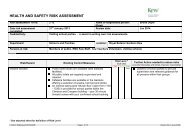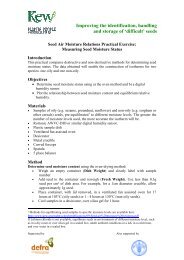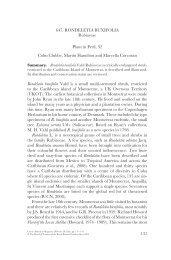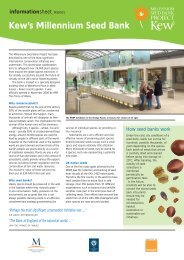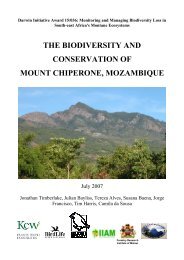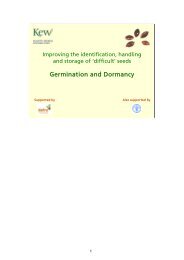Improving the identification, handling and storage of âdifficultâ seeds ...
Improving the identification, handling and storage of âdifficultâ seeds ...
Improving the identification, handling and storage of âdifficultâ seeds ...
You also want an ePaper? Increase the reach of your titles
YUMPU automatically turns print PDFs into web optimized ePapers that Google loves.
A total <strong>of</strong> 346 species from <strong>the</strong> combined list are held at <strong>the</strong> Millennium Seed Bank (MSB),<br />
representing 220 genera <strong>and</strong> 67 families. This amounts to 2067 accessions originating from 94<br />
different countries. Table 3 shows <strong>the</strong> families represented in <strong>the</strong> combined species list with <strong>the</strong><br />
greatest number <strong>of</strong> accessions at MSB.<br />
Table 3. Families represented in <strong>the</strong> combined species<br />
list with <strong>the</strong> most accessions at MSB<br />
Family<br />
Accessions<br />
GRAMINEAE 537<br />
LEGUMINOSAE-MIMOSOIDEAE 161<br />
LEGUMINOSAE-PAPILIONOIDEAE 607<br />
Analysis<br />
The species list was analysed against Kew’s Seed Information Database (Flynn et al, 2006) <strong>and</strong> <strong>the</strong><br />
MSB’s in-house Seed Bank Database, in order to produce information on seed <strong>storage</strong> behaviour<br />
<strong>and</strong> germination requirements. It was also cross-checked against a recent study <strong>of</strong> species seed<br />
longevity characteristics (Walters et al, 2005)<br />
Storage behaviour<br />
420 individual records <strong>of</strong> <strong>storage</strong> conditions were found in SID, representing 375 species from <strong>the</strong><br />
combined species list. Most <strong>of</strong> <strong>the</strong> species showed orthodox <strong>storage</strong> behaviour (Table 4). Orthodox<br />
<strong>seeds</strong> can be dried to low moisture contents <strong>and</strong> <strong>the</strong>ir longevity increases with reductions in<br />
moisture content <strong>and</strong> temperature, over a range <strong>of</strong> <strong>storage</strong> environments. Approximately 15% <strong>of</strong><br />
<strong>the</strong> species were “questionably” orthodox <strong>and</strong> only 5% were found to be recalcitrant. Recalcitrant<br />
<strong>seeds</strong> do not survive drying <strong>and</strong> so are not suitable for long term <strong>storage</strong>. In SID, this category<br />
includes <strong>seeds</strong> described as viviparous, including some aquatic species.<br />
Table 4. Species from combined list with <strong>storage</strong> behaviour records in SID<br />
Storage behaviour Number <strong>of</strong> species %<br />
Orthodox 299 79.73<br />
Recalcitrant 15 4.00<br />
Recalcitrant? 2 0.53<br />
Intermediate 2 0.53<br />
Intermediate? 1 0.27<br />
Orthodox? 21 5.60<br />
Orthodox p 33 8.80<br />
Uncertain 2 0.53<br />
Total no <strong>of</strong> species 375<br />
Of <strong>the</strong> species in <strong>the</strong> ITPGRFA list with <strong>storage</strong> behaviour records in SID, only two (Artocarpus<br />
altilis <strong>and</strong> Cocos sp.) are recalcitrant. One (Colcasia esculenta) is classed as possibly orthodox <strong>and</strong><br />
<strong>the</strong> remainder are fully orthodox.<br />
Identifying “difficult” species from MSB germination tests<br />
The combined species list was analysed for germination data in MSB’s Seed Bank Database.<br />
Germination testing at <strong>the</strong> MSB involves initial testing after at least 1 week <strong>of</strong> cold <strong>storage</strong>,<br />
followed by re-testing at 10-year intervals. Initial tests are conducted (depending on <strong>the</strong> size <strong>of</strong> <strong>the</strong><br />
collection) until a germination percentage <strong>of</strong> 75% or more is achieved. Germination test results are<br />
available for a total <strong>of</strong> 292 species (1620 accessions) from <strong>the</strong> combined species list, amounting to a<br />
total <strong>of</strong> 4441 germination tests, including initial tests <strong>and</strong> re-tests (Table 5).



